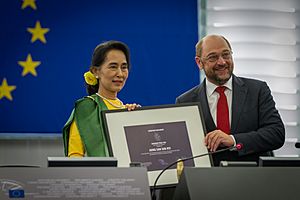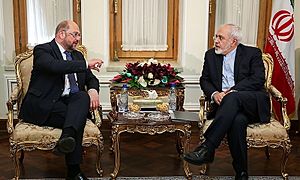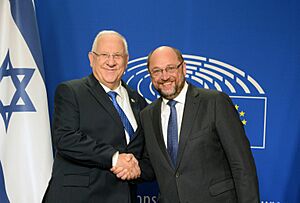Martin Schulz facts for kids
Quick facts for kids
Martin Schulz
|
|||||||||||||||||||||||
|---|---|---|---|---|---|---|---|---|---|---|---|---|---|---|---|---|---|---|---|---|---|---|---|

Schulz in 2017
|
|||||||||||||||||||||||
| Chair of the Friedrich Ebert Foundation | |||||||||||||||||||||||
| Assumed office 14 December 2020 |
|||||||||||||||||||||||
| Deputy | Daniela Kolbe Michael Sommer |
||||||||||||||||||||||
| Preceded by | Kurt Beck | ||||||||||||||||||||||
| Leader of the Social Democratic Party | |||||||||||||||||||||||
| In office 19 March 2017 – 13 February 2018 |
|||||||||||||||||||||||
| General Secretary | Hubertus Heil Lars Klingbeil |
||||||||||||||||||||||
| Deputy |
|
||||||||||||||||||||||
| Preceded by | Sigmar Gabriel | ||||||||||||||||||||||
| Succeeded by | Andrea Nahles | ||||||||||||||||||||||
| President of the European Parliament | |||||||||||||||||||||||
| In office 17 January 2012 – 17 January 2017 |
|||||||||||||||||||||||
| Vice President | Gianni Pittella Antonio Tajani |
||||||||||||||||||||||
| Preceded by | Jerzy Buzek | ||||||||||||||||||||||
| Succeeded by | Antonio Tajani | ||||||||||||||||||||||
| Leader of the Progressive Alliance of Socialists and Democrats | |||||||||||||||||||||||
| Acting 18 June 2014 – 1 July 2014 |
|||||||||||||||||||||||
| Preceded by | Hannes Swoboda | ||||||||||||||||||||||
| Succeeded by | Gianni Pittella | ||||||||||||||||||||||
| In office 15 July 2004 – 17 January 2012 |
|||||||||||||||||||||||
| Preceded by | Enrique Barón Crespo | ||||||||||||||||||||||
| Succeeded by | Hannes Swoboda | ||||||||||||||||||||||
| Mayor of Würselen | |||||||||||||||||||||||
| In office 1987–1998 |
|||||||||||||||||||||||
| Preceded by | Bernd Thielen | ||||||||||||||||||||||
| Succeeded by | Wolfgang Peltzer | ||||||||||||||||||||||
|
|||||||||||||||||||||||
| Personal details | |||||||||||||||||||||||
| Born | 20 December 1955 Kinzweiler-Hehlrath, North Rhine-Westphalia, West Germany (now Eschweiler-Hehlrath, Germany) |
||||||||||||||||||||||
| Political party | Social Democratic Party (1975–present) | ||||||||||||||||||||||
| Spouse |
Inge Schulz
(m. 1985) |
||||||||||||||||||||||
| Children | 2 | ||||||||||||||||||||||
| Residences | Würselen, Germany | ||||||||||||||||||||||
| Signature |  |
||||||||||||||||||||||
Martin Schulz (born 20 December 1955) is a German politician. He was a Member of the European Parliament (MEP) for Germany from 1994 to 2017. Later, he served as a Member of the Bundestag (MdB) from 2017 to 2021.
During his time in politics, he led the Progressive Alliance of Socialists and Democrats from 2004 to 2012. He also served as President of the European Parliament from 2012 to 2017. From 2017 to 2018, he was the leader of the Social Democratic Party.
In 2016, Schulz decided not to seek another term as President of the European Parliament. Instead, he aimed to become the German Chancellor in the 2017 elections. Sigmar Gabriel, the then-leader of the Social Democratic Party, supported Schulz as his replacement. After the 2017 elections, Schulz stated that his party would not join a government led by Angela Merkel. However, he later changed his mind and entered coalition talks. He stepped down as party chair in February 2018. Since December 2020, he has been the Chair of the Friedrich Ebert Foundation.
Contents
Early Life and Education
Martin Schulz was born on December 20, 1955, in Hehlrath, a village now part of Eschweiler. He grew up in western Rhineland, close to the borders of the Netherlands and Belgium. His father was a policeman, and his mother was active in the Christian Democratic Union.
From 1962 to 1975, Schulz attended a private Roman Catholic school. He left school without completing his Abitur, which is a final exam needed for university. After school, from 1975 to 1977, he trained to be a bookseller. He then worked for different publishing houses and bookshops. In 1982, Schulz opened his own bookshop in Würselen.
Early Political Career
Schulz joined the SPD in 1974 when he was 19 years old. In 1984, he was elected to the Würselen Municipal Council. He served on the council until 1998.
From 1987 to 1998, he was the Mayor of Würselen. At 31, he was the youngest mayor in North Rhine-Westphalia at that time. As mayor, he helped create a partnership between Würselen and the French city of Morlaix.
Member of the European Parliament (MEP)
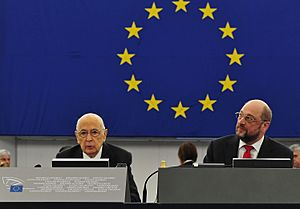
In 1994, Martin Schulz was elected to the European Parliament. He represented Germany there until 2017. From 2000 to 2004, he led the SPD group within the European Parliament.
Schulz worked on several important committees. These included the Committee on Civil Liberties, Justice and Home Affairs. He also served on the Subcommittee on Human Rights. In 2004, he became the leader of the Socialist Group in the European Parliament. He held this role until 2012.
Schulz strongly supported European cooperation. His ideas greatly influenced his party's pro-European policies. In 2004, he helped block the appointment of an Italian nominee to the Barroso Commission. This was because of the nominee's publicly stated views.
President of the European Parliament
On January 17, 2012, Martin Schulz was elected President of the European Parliament. He received 387 votes out of 670. As President, he worked with EU Commission President Jose Manuel Barroso and EU Council President Herman van Rompuy.
Together, they accepted the 2012 Nobel Peace Prize on behalf of the European Union. The Nobel Committee honored the EU for its work in promoting peace and human rights in Europe for over sixty years.
Schulz was skilled in diplomacy. He visited Turkish President Recep Tayyip Erdoğan after a coup attempt in 2016. He also met with Iranian President Hassan Rohani in 2015 to improve relations. In November 2016, Schulz announced he would not seek a third term as President. He returned to German politics and left the European Parliament in February 2017.
Candidate for European Commission President
In November 2013, Schulz was nominated as a candidate for President of the European Commission. This was a new idea to have the President chosen through democratic elections. He was the only candidate from the Party of European Socialists.
On March 1, 2014, Schulz officially accepted the nomination in Rome. He ran against Jean-Claude Juncker and Guy Verhofstadt. However, his party came second in the European elections. As a result, Schulz did not become President of the European Commission. Instead, he remained President of the European Parliament.
German Domestic Politics
Since 1999, Martin Schulz has been a part of the SPD leadership. He worked with several party chairmen over the years. He also served as a delegate to the Federal Convention multiple times. This convention elects the President of Germany.
In 2013, he was part of the talks to form a new government after the federal elections. He led the SPD group on European affairs during these discussions.
2017 Federal Election Campaign
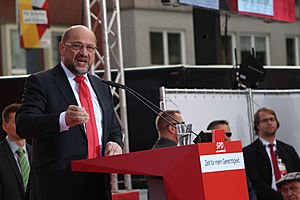
In January 2017, Schulz was confirmed as the Social Democrats' candidate for Chancellor. In March, he was unanimously chosen as the official head of the party. This was a rare event in post-war Germany.
After his nomination, his party's support in public opinion polls grew significantly. For a short time, it seemed possible that Schulz could challenge Angela Merkel for the chancellorship. However, the Social Democrats received only 20.5 percent of the vote in the September 2017 federal elections. This was a new low for the party.
After the 2017 Election
After the election results, Schulz stated that the SPD would not form another "Grand Coalition" with Angela Merkel's party. He said the SPD would go into opposition. However, when other coalition talks failed, he reconsidered.
In February 2018, coalition talks with Merkel's party were successful. Schulz announced he would become the Foreign Minister. But after strong criticism from within his party and the public, he decided not to join the new government. On February 13, 2018, Schulz stepped down as SPD Leader. He suggested Andrea Nahles as his replacement.
In December 2020, Schulz announced he would not run in the 2021 federal elections. He decided to retire from active politics at the end of his parliamentary term. At the same time, he was elected to lead the Friedrich Ebert Foundation, a position he holds today.
Political Views
European Integration
Martin Schulz is a strong supporter of the European Union. He believes that European unity is one of the greatest achievements of the past century. However, he also thinks that some responsibilities should be handled by national or local authorities. This would allow the EU to focus on bigger issues.
Schulz wants to make Europe and its institutions stronger. In 2016, he proposed a plan with Vice Chancellor Sigmar Gabriel to reform the EU. This plan called for a stronger European government, overseen by the European Parliament.
He often says that the European Union helps to prevent problems like racism and xenophobia. After the United Kingdom voted to leave the EU in 2016, Schulz warned about breaking the tools that keep peace. In December 2017, he called for a new constitution for a "United States of Europe." He suggested that any country not accepting this constitution should leave the EU.
Security Policy
Schulz has spoken about Europe's military dependence on the United States. He noted that Europe often needs US support for military operations. He believes Europe needs its own headquarters for civil and military missions in Brussels. He also supports having deployable troops.
There have been discussions about creating a European Air Force. This force would include surveillance drones and transport planes.
Economy
Schulz believes that having a job with dignity is very important. He does not support the idea of an unconditional basic income. Instead, he favors fair wage agreements and secure jobs. He also supports employees having a say in decisions.
Foreign Affairs
In 2008, Schulz led a European Parliament group to Havana, Cuba. They discussed lifting EU sanctions against the country. In 2014, Schulz gave a speech to the Israeli Knesset. He criticized Israel for not giving Palestinians a fair share of water resources in the West Bank.
In 2015, during the Russo-Ukrainian War, Schulz suspended a committee of Russian and EU lawmakers. He also criticized Russia for blocking EU politicians from attending a funeral. In 2016, Schulz stated that Donald Trump was a problem "for the whole world." He linked Trump's rise to far-right populism in Europe.
Other Activities
- Business Forum of the Social Democratic Party of Germany, Member of the Political Advisory Board (since 2020)
- Bonner Akademie für Forschung und Lehre praktischer Politik (BAPP), Member of the Board of Trustees
- Friedrich Ebert Foundation (FES), Chairman (since December 2020)
- Institute for European Politics, Member of the Board of Trustees
- Stiftung "Achtung!Kinderseele", Member of the Board of Trustees
- IG Bergbau, Chemie, Energie (IG BCE), Member
Personal Life
Martin Schulz is married to Inge Schulz, and they have two children, Nico and Lina. He was raised Catholic but is now not actively practicing. He speaks German, English, French, Spanish, Italian, and Dutch.
Honors and Awards
National Honors
 Germany: Grand Cross of the Order of Merit of the Federal Republic of Germany (2006)
Germany: Grand Cross of the Order of Merit of the Federal Republic of Germany (2006) Germany: International Charlemagne Prize of Aachen (2015)
Germany: International Charlemagne Prize of Aachen (2015)
Foreign Honors
 Austria: Großes goldenes Ehrenzeichen der Republik (2008)
Austria: Großes goldenes Ehrenzeichen der Republik (2008) Russian Federation: Honorary Doctorate by the Kaliningrad State Technical University (2009)
Russian Federation: Honorary Doctorate by the Kaliningrad State Technical University (2009) France: Officer of the French Légion d'honneur (2010)
France: Officer of the French Légion d'honneur (2010) Romania: Collar of the Chamber of Deputies of Romania (2012); Doctor Honoris Causa title by the National School of Political Science and Public Administration of Bucharest (2012)
Romania: Collar of the Chamber of Deputies of Romania (2012); Doctor Honoris Causa title by the National School of Political Science and Public Administration of Bucharest (2012) Italy: Knight Grand Cross of the Order of Merit of the Italian Republic (2012)
Italy: Knight Grand Cross of the Order of Merit of the Italian Republic (2012) Portugal: Key of Honor to the City of Lisbon (2013)
Portugal: Key of Honor to the City of Lisbon (2013) Portugal: Grand Cross of the Order of Liberty (2017)
Portugal: Grand Cross of the Order of Liberty (2017)- Gold Medal of the Jean Monnet Foundation for Europe (2014)
South America
 Argentina: Grand Cross of the Order of the Liberator General San Martín (2016)
Argentina: Grand Cross of the Order of the Liberator General San Martín (2016)
Asia
 Israel: Honorary PhD by Hebrew University of Jerusalem (2014)
Israel: Honorary PhD by Hebrew University of Jerusalem (2014)
See also
 In Spanish: Martin Schulz para niños
In Spanish: Martin Schulz para niños
 | DeHart Hubbard |
 | Wilma Rudolph |
 | Jesse Owens |
 | Jackie Joyner-Kersee |
 | Major Taylor |


